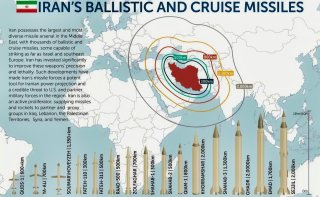The U.S. Must Re-Focus on Curbing Iran’s Nuclear Program
Iran is destabilizing the region and upending the global order. Washington and its allies must focus on developing a comprehensive plan of action.
Iran’s latest nuclear and ballistic missile advances make Israel’s war with Hamas and America’s skirmishing with Iranian proxy forces look like regional sideshows of a far more ominous main event.
The current situation in the region gives Iran “a unique opportunity and amplified internal justification for building nuclear weapons while the United States and Israel’s resources to detect and deter Iran from succeeding are stretched thin...,” the Institute for Science and International Security wrote in a new report. “[F]or the first time in years, we are facing the real possibility that Iran may choose to weaponize its nuclear capabilities and build nuclear weapons.”
It wouldn’t take Tehran long to do so. With a large stockpile of uranium enriched to sixty percent purity, the institute estimated that the regime could further enrich enough uranium to weapons-grade purity, with the ability to produce a nuclear bomb in a week. Along with strengthening its nuclear infrastructure through building more reactors, enriching more uranium, and refusing to cooperate with international nuclear inspectors, Tehran also continues to advance its ballistic missiles, which could carry nuclear warheads to strike U.S. allies in the region and possibly even the United States itself. In January, the Islamic Republic launched a satellite 450 miles into space, using technologies with “significant overlap” with those of longer-range ballistic missiles.
The implications of Iran’s nuclear-related advances are enormous. Iran could launch an attack against the United States or Israel, its most hated adversaries. Furthermore, it could also transfer a bomb to a proxy (e.g., Hamas or Hezbollah) to use against Israel or another adversary.
All of this demands U.S.-led action on at least two fronts.
First, Washington must restore “deterrence” against Iran by unleashing a more robust, more persistent military response to proxy attacks. The Biden administration’s current response is clearly not convincing Tehran to rein in its proxies. Undeterred on the battlefield, Tehran is increasingly encouraged to pursue its nuclear-related goals and dismiss vague warnings from the United States.
Second, the United States and its allies should develop and implement a concrete plan to confront Iran over its nuclear-related pursuits, using every means at their disposal to ensure that Iran will never develop or acquire nuclear weaponry.
It is essential to consider what Iranian proxies in the “axis of resistance,” who enjoy funding, equipment, and training from Tehran, are currently doing across the region.
Hamas, the genocidal terrorist group that runs Gaza, slaughtered 1,200 Israelis and took more than 200 hostages on October 7, with its leaders vowing to launch attacks until it fulfills its mission of destroying Israel. Hezbollah, a more potent terrorist group in southern Lebanon, has been attacking Israeli communities and military posts along Israel’s northern border on a near-daily basis since October 8, raising concerns that Jerusalem will have to turn its guns on Hezbollah after finishing Hamas.
The Houthi rebels of Yemen have also fired missiles against Israel and attacked commercial vessels in the Red Sea with drones, missiles, and speedboats. This has complicated shipping through the international waterway, convincing some shipping companies to take a much longer route around southern Africa and prompting the United States and Britain to strike Houthi targets.
Since Hamas’ attack on October 7, the Houthis and other Iranian-backed militias have launched about 170 attacks on U.S. troops across the region, with one killing three soldiers in Jordan in late January.
Now, consider how much worse all of that would get if Iran developed a nuclear capacity. Israel already faces the wrath of global public opinion and the impatience of Washington, among other allies, when it responds militarily to unprovoked and bloody attacks on Israeli soil. Could it still respond effectively if Iran threatened a nuclear response?
Could Washington still act forcefully to protect its regional allies and the free flow of commercial shipping if Iran threatened to respond by launching a nuclear attack?
The United States and its allies are justifiably focused on the bloody conflicts across this turbulent region. Israel is still reeling from the worst attack on Jews since the Holocaust. Thousands of Palestinians are dying in Gaza as Israel roots out Hamas, and U.S. troops are under fire.
However, Iran could be on the cusp of destabilizing the region and upending the global order in a far more fundamental way. Therefore, Washington and its allies must focus on the bigger picture and develop a comprehensive plan of action.
About the Author
Lawrence J. Haas is a senior fellow at the American Foreign Policy Council and the author of, most recently, The Kennedys in the World: How Jack, Bobby, and Ted Remade America’s Empire (Potomac Books).
Image: CSIS/Creative Commons.


